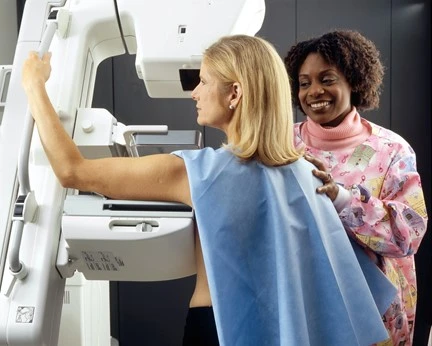October is breast cancer awareness month, and if you haven't had a mammogram in a while, it's time. While most of the world was on lockdown and healthcare professionals were on the front lines of the pandemic, many postponed their breast cancer screenings. The CDC reported an 87% decline in breast cancer screening tests in 2020.
Not wanting to go into a doctor’s office with potentially infectious patients during a pandemic is understandable. But with breast cancer, early diagnosis greatly improves your chances of successful treatment. Prolonging preventive screenings makes early diagnosis less likely and can lead to other health related outcomes.
Health Benefits of Preventive Screening
The biggest benefit of preventive screenings is that you are able to detect symptoms of cancer before symptoms appear. An x-ray, mammogram, or other screening lets professionals see abnormalities even if you don’t have lumps or other symptoms.
Catching breast cancer early makes it more likely that your treatment will be successful. Early detection also helps you treat cancer with less invasive treatments. A preventive screening can catch cancer in its earliest stages, meaning that you might be able to avoid having a mastectomy or other invasive procedures. People who detect their cancer early have a 93 percent survival rate in the five years following treatment.
Types of Preventive Screening
Mammograms
This is probably the most well-known type of preventive measures. Mammograms simply refer to a breast x-ray. A mammogram provides clear and reliable imaging, and it’s one of the best ways to detect cancer in its earliest stages.
Breast Magnetic Resonance Imaging (MRI)
For people at an increased risk of breast cancer or for those whose mammogram has shown abnormalities, it may be necessary to do an MRI. This involves using magnets and radio waves to take pictures of breast tissue. MRIs can appear abnormal for reasons other than cancer. They are not often used on people of average risk.
Clinical Breast Exam
When you’re at your annual gynecologist appointment, your doctor will usually perform a clinical breast exam. This involves feeling your breast tissue for abnormalities or lumps. Ask for one during your annual doctor visit. You can also perform self exams at home and should do so monthly.
Schedule Your Preventive Screening
If you’re one of the 87% who put off your preventive screening in 2020, make sure you schedule it soon. Breast cancer is one of the most common women's health issues in the United States, and it disproportionately impacts people with lower incomes. Low-cost and even free screenings are available all over the country. Taking this easy step might feel uncomfortable or embarrassing at first, but it might just save your life. If you are being treated for cancer, RxLess can help you save money on prescriptions, so you can stress less and focus on getting better.

















